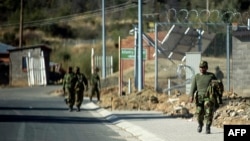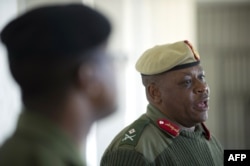The tiny nation of Lesotho was rocked early Saturday by reports of an attempted coup, with soldiers taking over government facilities and police stations in the capital. From the safety of neighboring South Africa, the nation's prime minister said the action was a coup attempt and he feared for his life. But two days later, no figure has emerged to take power.
Whatever happened Saturday in the tiny nation of Lesotho followed the script of a typical African coup d’etat, occurring just months after the prime minister dissolved parliament and a fragile coalition government fell apart.
The government of neighboring South Africa reacted rapidly, saying “by all accounts the activities of the Lesotho Defense Force thus far bear the hallmarks of a coup d’état.”
But by Monday, no one was so sure. No new leader has emerged and an army spokesman denied there was a coup attempt, saying the military was trying to prevent a police-backed protest scheduled for Monday from turning violent. The spokesman said soldiers had returned to their barracks.
Shaky alliance
That protest against the prime minister was to be led by his deputy and political rival. The two have been locked in an uneasy coalition government since 2012. The deputy prime minister also denied the soldiers’ actions amounted to a coup attempt.
Whatever happened, talks involving the Southern Southern African Development Community were under way Monday to try to patch things up. Lesotho Prime Minister Thomas Thabane and Deputy Prime Minister Mothetjoa Metsing were both involved in the talks.
An aide to Thabane said the prime minister had requested peacekeepers be sent to Lesotho, a small mountain country encircled by South Africa.
Southern Africa analyst Dimpho Motsamai of the Pretoria-based Institute of Security Studies predicted in July that “a fallout between the parties seems imminent” after the coalition broke down.
She said what happened Saturday was not a coup. “Rather," she says, "it can be called actions of anarchy that are of a treasonable nature."
"Basically, the commander of the Lesotho Defense Force, the army chief [Lieutenant-General Tlali Kamoli] was fired on Friday... And what had happened is that the soldiers that are aligned to the commander of the LDF raided several police stations over the weekend and also wanted to raid the residency of the prime minister, and [that's] the reason why he has left the capital," she said. "And this was basically to intimidate the prime minister and try to force him to change the decision to fire him [i.e., the army chief]."
Motsamai said the actions were widely seen as a coup attempt because of Thabane’s claim his life was under threat. She said, though, he has left out a big part of the story.
“He is not talking about the reason why this is happening, which is the wider political context in the country to do with the collapse of the coalition government of which he is part of," she said. "And that is the real issue here at play, and the reason why the insecurity being perpetuated by the army chief is happening.”
Motsamai said SADC will have to continue its mediation talks that started amid the coalition’s collapse earlier this year, but the regional body has another mandate.
“The second issue, though, which is much more primary, I think, and which needs to be established first before any dialogue can happen, is to reestablish the security in Maseru, and and to provide security and support to the prime minister, so that he does not feel like his life is threatened when he goes back into the country," she said. "That will be important, of course, as a way of creating a conducive environment for any political dialogue to be facilitated by South Africa and by SADC.”
It is not the first time Lesotho has suffered a political crisis. Since gaining independence from Britain in 1966, Lesotho has had several military coups, most recently in 1998. The nation is a constitutional monarchy, in which the king’s powers are largely ceremonial.
Coup or no coup, one very worrying fact hangs over this tiny nation after this weekend’s events: No one seems to be in charge.





